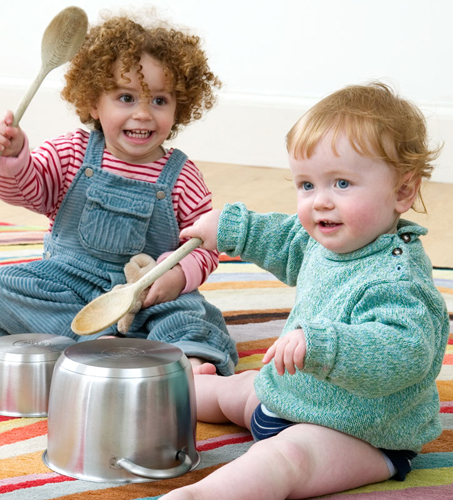The stages of play
Responding to your
child at her level is crucial. Babying a four-year-old will stop her
from testing her capabilities and developing, while having expectations
beyond your child’s years will set her up for early anxiety and the
possibility of “performance failure” and disappointment.
Play develops through a number of stages:
All children begin by
playing alone. Solitary play then transforms into parallel play (playing
alongside peers) and imitative play (that may involve peers). Finally,
there is cooperative play when a child learns to share toys and
playtime. Newborn babies are so attached to their mother that they have
no notion of being separate or having their own identity. By twelve
months a unique personality will be more apparent, but your little one
will not be ready to play cooperatively with other children until her
brain has developed more fully and language skills have developed to a
point where communication with other children becomes more effective.
Exploratory play—using the senses of touch, taste, and smell to comprehend new experiences.
Relational play—using things as they are meant to be used. For example, using a fire truck to pretend to extinguish a fire.
Symbolic play—using an object as something else. For example, using a house brick as a stove to cook on.
12–15 months
At this age your child
needs guidance from you on how to play. For example, show her how a toy
functions and then allow her to explore it in her own way. You may
notice early signs of play activity, especially if you demonstrate
things. She may watch other children, but will play alone, with no
attempt to interact with another child.
16–20 months
Your child will still
need to be guided in her play at this age, and will constantly watch and
imitate. Imaginative or “pretend” play will develop later. She will
become more aware of other children and be more likely to copy their
actions and play alongside them.
Leading playtime
Young children are usually fascinated by older children and very
willing to follow their lead, which can accelerate their social skills.

21–24 months
By the time your child is
two, there will be the first signs of role reversal in your
relationship. You will suddenly find that you are the recruit in her
play and your role will have evolved into one that supports and
encourages rather than leads. She will begin to understand the concept
of, for example, pretending to drink from a toy cup and enjoy creating
her own world and stories. As she learns to direct her play, she will
develop reasoning skills and a sense of achievement. Importantly, this
also sows the early seeds of self-esteem and self-confidence.
25–30 months
By this age your toddler
will be able to suggest a story line and will look to you to elaborate
the scenario and to add new developments. Your child will now be able to
play alongside other children. When playing together, children will
give a running commentary and start to tell each other what to do, but
they will not yet be ready to co-operate or plan a joint activity.
31–36 months
At this age your toddler
will begin to think for herself and begin to experiment with the
difference between fantasy and reality, through basic imaginative play,
using props. By the age of three, children can understand the concept of
sharing, but will still find it hard to accept it in practice.
Children are quite
territorial at this age and tend to think of toys and any other objects
they are attached to as an extension of themselves—even when they do not
belong to them and they are not using them. They have a short attention
span and are too egocentric to understand that other people have needs
or feelings. Egocentric does not mean selfish in this context. Your
toddler is at a stage where, when she closes her eyes, she thinks that
no one can see her—because she can’t see anyone. Her view of the world
is her whole world view. A child that is refusing to share is not being
wilfully disobedient, but is simply too young to be able to fully
understand your reasoning. Learning how to respond to others, share,
compromise, and put the needs of others before yourself are highly
sophisticated skills that take years to acquire.
37–48 months (and beyond)
By the age of four your
child may play independently and adopt an imaginary role. She will
understand the difference between characters and roles and have clear
ideas about a story line. Some (up to the age of eight) will have an
imaginary playmate and may find it difficult to tell the difference
between fantasy and reality.
Stages of brain development
Your child’s brain develops in
stages. The “lower” brain areas, which drive instinctive and emotional
responses, develop first. The “higher” rational brain, which
distinguishes humans from animals and reptiles, develops later. It
contains the frontal lobes, which have only partially developed at the
time of birth. Not until the age of three will they have matured to a
point where they will help a child to manage her emotions or curb her
impulses. The need for instant gratification can be overwhelming, which
is why toddlers are prone to tantrums when they can’t have what they
want. Varied play helps children to start to learn self-control and will
develop the behavior-regulating function of the frontal lobes of the
brain.